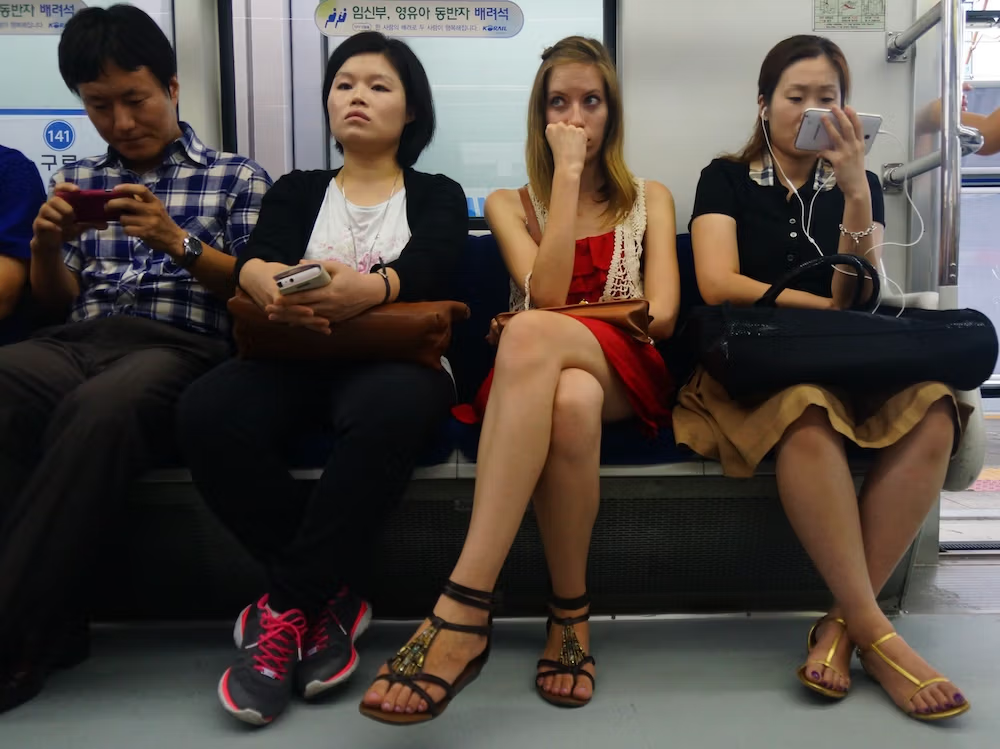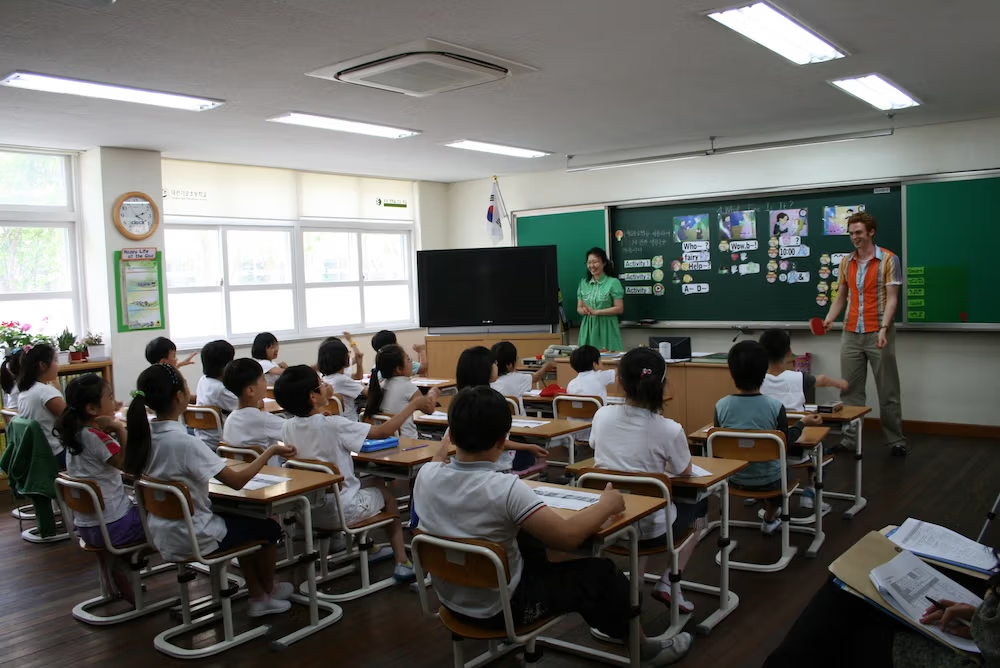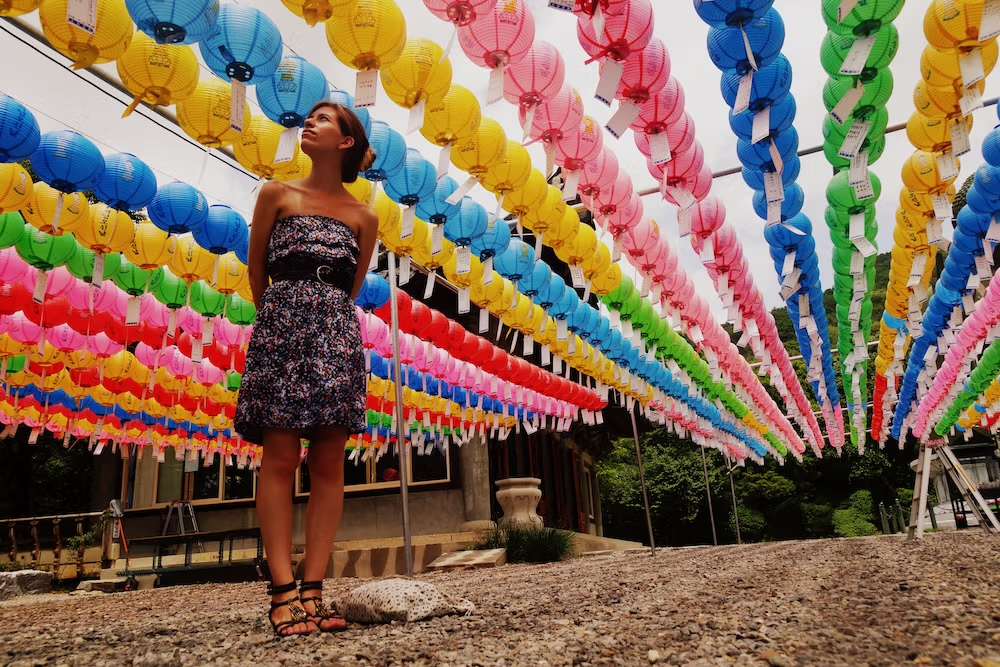Let’s talk money. Sure, some may say talking about your salary is gauche, but if you’re looking to move to Korea to work as an ESL teacher (like I did), then money is surely one of the first things on your mind.
Whether your motivation is paying back student loans, saving up for grad school, or funding an extended backpacking trip around the world, it’s more than just ‘culture’ that draws young university graduates all the way out here! I’m talking won, and millions of won!
How To Save Money Teaching English in South Korea

Can you save money teaching in Korea for a year?

Before we figure out how much you can save in a year, I’m going to talk you through my salary and my monthly spending so that you too can figure out how much you’ll be able to save depending on your lifestyle.
The salary of an English teacher can range from 1.9 million won to 2.4 million won for teaching at a public school or a private academy (hagwon). Pay varies on location, experience, education, and additional TESL certifications.

My salary as an English teacher = 2.1 million won
And this is a look at how I spent my money on a monthly basis:
Accommodation
Free! One of the best things about working as a teacher is that your Korean apartment is covered by your school!
Total = 0

Food
Eating out in Korea is very affordable if you eat at your local kimbap restaurant. These little restaurants serve traditional Korean meals, most of which revolve around rice, noodles, and kimchi. You can expect to get a tuna or tofu stew with rice for 5,000 won, kimchi fried rice for 4,000 won, or beef dumplings for 2,500 won. Because many of the meals in these restaurants are rice based, they are very filling. Also, every dish comes with at least 3 side dishes which means you’re getting your money’s worth. If you go out to a foreign food restaurant you can expect to pay 10,000 to 20,000 for a dish.
Groceries are a completely different story, especially when it comes to the fresh produce section – ie. fresh fruits and vegetables cost about the same as gold.
I usually ate out once a day and cooked a simple meal at home.
Total = 400,000 won
Booze
I went out for drinks a few times when I first moved here and soon realized it was putting a hole in my wallet as well as ruining my Saturday mornings, so that was that. No soju or makkoli for me aside from the occasional get together.
If you do drink, you can expect to pay 10,000 won for cocktails at a bar. (You can easily spend 50,000 to 100,000 won in one night depending on how heavy you’re going.) A pitcher of local beer will be fairly cheap, and even cheaper than that is going to the local 7 Eleven or grocery store and picking up a bottle of soju.
Total = 0 won

Transportation
If I had stayed in my city there wouldn’t have been a need for me to use transportation; my work was a 2 minute walk away, and I had a supermarket, movie theatre and restaurants within walking distance. However, staying within the confines of your neighbourhood when you’re in a new country is highly unlikely – you’ll want to explore!
I used to charge 10,000 won a week on my T-money card to go out on weekends, and I was using mine A LOT! You may be able to get by on less depending on how often you use it.
Total = 40,000 won
Telephone
I got the most basic plan I could find at ‘The Arrival Store’ which happened to be a used cell phone. I paid $40 USD to rent my phone for the year, and my monthly bill came to 30,000 won (roughly $30) a month. It was a very straight forward process; I ordered the phone online and it was promptly delivered to my desk the following day.
Total= 30,000 won
Electric bill
I’ve heard some teachers had ridiculously low bills around 50,000 won a month, but unfortunately, that wasn’t the case for me. Even though I consumed very little electricity, my bill usually hovered around the 120,000 mark as did my coworkers’ bills. I have a feeling that in my particular building each apartment paid a set fee based on its size and occupancy as opposed to consumption.
Total= 120,000 won
Gas bill
This was my favourite bill of them all – the one for the gas I used on my cooking stove. The highest bill I ever got was just under $3 USD, but it was often just over $1.50 USD. Best part about it was that this bill only came every 3 months! That goes to show you how often I cooked, or how cheap the gas is…
Total = 2,000 won
Internet bill
Again, there were cheaper internet providers out there, but I was stuck with the plan the previous teachers had. Not a complete rip-off, but you can get monthly plans for as little as 18,000 won.
Total = 30,000 won
Going out & shopping
A lot of the places I visited this year around the country and around my city were either free or extremely affordable: temples, food markets, palaces, museums, parks.
In terms of shopping, I am probably not the best example since I was absolutely frugal this year. I recall going shopping a total of 4-5 times and one of those times I stumbled upon a massive sale at Forever21 which means I walked out with a handful of cute summer dresses for a fraction of their original cost. When I wasn’t shopping in the sales rack, I was browsing the underground shopping center at Jonggak Station, where there are bargains to be had.
I went out during the spring and summer months a lot more than I did during winter (which I spent hibernating indoors), but this is my rough estimate.
Total = 120,000 won

Trips around Korea
I travelled quite a bit during my year in Korea. There were a few overnight trips to places like Busan, Damyang, Gwangju and Boseong, and lots of day trips to places like Seoul, Cheonan, Boryeong, Daejeon and Samcheok.
The day trips were quite affordable, especially travelling on the Mugunghwa train. They usually came to no more than 35,000 won including transportation and food in the city.
Weekend trips including food, transportation, accommodations , and sightseeing usually came to 150,000 won. Of course these overnight weekend trips weren’t a monthly occurrence, but I’ll keep those in as a monthly cost in case you’re planning to do quite a bit of travel.
Total = 150,000 won
Deductions
There were also monthly deductions made to my pay cheque in the form of a security deposit for my apartment, and tax contributions, but I have not included those as most of that money was returned to me at the end of the year.
The Bonuses!
If you last a full year in Korea, then your bank account is in for a real treat on month number 12! Aside from your final pay cheque, you’ll get your severance pay (which is equal to one month’s pay), your pension (to which you contribute half, and your employer contributes the other), your apartment’s security deposit, and your airfare reimbursement for your flight back home.

What was left over at the end of the month?
1,208,000 won
That is roughly about $1,083 (USD) left over at the end of the month. So, times that by 11 months (because my first month’s pay was measly) and you have $11,913 at the end of the year. Plus add all your bonuses which you get at the end which come to over $5,000.
You have yourself roughly $ 17,000 in one year.
I’ll admit, I was careful with my spending, but I also had plenty of weekends away and outings in the city. I know people who have managed to save even more than I did, and others who managed to save less. It all depends on your lifestyle and just how motivated you are.

Level‑Up Your Korean ESL Savings: A Practical 12‑Month Playbook
Goal: Take the baseline ₩17 million (~US $17k) example and push it even further—without living like a hermit.
Who it’s for: First‑time teachers, late‑career changers, and anyone who wants to stash serious won while still enjoying the kimchi, karaoke, and weekend getaways.
Choose Your Contract Wisely
Public school (EPIK, GEPIK, SMOE) vs. Hagwon
| Factor | Public | Hagwon |
|---|---|---|
| Base salary | ₩2.0–2.3 M | ₩2.1–2.5 M |
| Hours | 8 a.m.–4 p.m. (M–F) | Varies; often afternoons/evenings |
| Job security | Stable (Gov’t) | Depends on owner; research is vital |
| Vacation | 18–26 days + national hols | 7–14 days + national hols |
| OT pay | Rare | Common—but negotiate rate |
Money move:
If you’re a night owl who can handle the occasional schedule change, a reputable hagwon with guaranteed OT can add ₩300 k–₩500 k a month. Just vet the school through forums (Dave’s, Reddit r/TEFL, Facebook groups) and ask to email a current teacher.
Reduce Fixed Costs Before You Even Arrive
| Category | Old‑School Plan | Upgrade for Extra Savings |
|---|---|---|
| Phone | ₩30 k basic SIM | Pick up a used unlocked LTE phone (Hongdae electronics market) + MVNO SIM (U+ 알뜰폰) = ₩16 k/month, 5 GB data |
| Internet | ₩30 k shared | Split the bill with neighbours using a dual‑band router; average drops to ₩12 k |
| Utilities | ₩120 k flat | Install a ₩10 k plug‑in space heater + shut off ondol after 10 p.m. → winter bill ~₩70 k |
| Insurance | Employer provides | Top‑up travel/gear insurance via World Nomads for under ₩10 k/month |
Annual delta: roughly ₩840 k saved.

Hack Your Food Budget Without Subsisting on Ramyeon
Master the “₩5 000 rule.”
If a restaurant charges more than ₩5 000 for lunch, it better come with unlimited 반찬 (banchan) or takeaway leftovers.Wholesale Wednesdays.
Visit your local 하나로 Mart or Costco (membership ₩38 k) mid‑week for bulk boneless chicken, rice, and frozen veg.
Meal‑prep “dak‑galbi bowls” for ₩2 200 a portion.
Seasonal produce cycles.
Strawberries (Jan–Mar), cherries (June), persimmons (Oct). Buy crates, freeze half.
School lunches = free macros.
Public school teachers: never skip kimchi‑jjigae day—it’s your protein quota and saves ₩35 k/week.Social dining swaps.
Rotate jeonse dinners with your teacher squad: each host cooks one low‑cost dish, everyone BYOB. Cheaper (and quieter) than Hongdae bars.
Leverage Korea’s Banking Perks
| Tactic | Why It Rocks | Steps |
|---|---|---|
| Installment savings account (적금) | 2.5 %–3.3 % annual interest & forced saving discipline | Open at KEB Hana or Shinhan; auto‑draft ₩900 k/month; maturity bonus aligns with contract finish |
| Tax refund (연말정산) | Up to ₩200 k refund if you log debit/credit purchases | Link card to 국세청 app > export “소득공제” file come February |
| Telegraphic Transfer (TT) fee waiver | Normal TT = ₩18 k each time | Keep ≥ US$1 000 in foreign currency account; request waiver code from the branch |
End‑of‑year interest + refunds can tack on another ₩500 k–₩700 k to your total.

Build “Monk‑Mode” Weekdays, Flexible Weekends
Monday–Thursday (no‑spend basics)
After‑work workout: Free outdoor calisthenics parks; if winter, jump rope in your apartment.
Language exchange: 1‑hr session = free coffee coupon + new 친구 (friend).
Skill stack: Take a free Coursera TESOL specialization—boosts future salary tiers.
Friday night rule: Subway home by last train (≈ ₩1 300) or crash at a jjimjilbang (₩11 k) instead of paying taxi fares.
Saturday splurge: One monthly “treat yo’ self” Seoul day—budget ₩60 k for brunch, COEX aquarium, and craft beers.
Sunday reset: Meal‑prep, bank transfer, WhatsApp family chat—zero spend.
Average variable spending: ₩90 k/week → ₩360 k/month.
Monetise Your Time (Without a Second Visa)
Important: Check your E‑2 or EPIK contract. Most secondary work is technically illegal without an “F” visa. Below are legal or grey‑but‑accepted methods many teachers use. Move at your own risk.
Proof‑reading & editing
University professors often pay ₩30 k per 1 000 words.
Build rapport by attending free campus language clubs.
Online tutoring (outside Korea‑based platforms)
Cambly or Preply (USD pay, outside Korean labour jurisdiction). Earn $15/hr, set weekend hours.
YouTube or blogging
AdSense payout after $100 threshold; document K‑beauty or hiking.
Estate “key money” arbitrage
If you inherit a friend’s apartment with ₩5 M deposit, upgrade to one offering ₩7 M deposit + lower monthly rent, pocket the spread (requires landlord approval).
Even a modest ₩250 k/month side income increases annual savings by ₩3 M.

Exit Strategy: Maximise the Big Payout
| Lump‑Sum Item | Average ₩ | Optimization Hack |
|---|---|---|
| Severance | 2.1 M | Negotiate minor OT in final month—they calculate on average salary |
| Pension (for Canadians/US‑citizens) | 2.3 M–2.6 M | Ensure HR submits last month premium; file airport refund early (Incheon “Hana Bank/ NH”) |
| Security deposit | 0.5 M–1.0 M | Film apartment walk‑through; push for same‑day bank transfer |
| Flight reimbursement | 1.2 M | Book early saver fare (₩700 k) → keep difference |
Total “Golden Parachute” ≈ ₩6 M–₩7 M if you tick every box.
One‑Year Financial Snapshot
| Category | Monthly ₩ | Annual ₩ |
|---|---|---|
| Net salary after tax | 2 050 k | 24 600 k |
| Living costs (after hacks) | –830 k | –9 960 k |
| Core savings | 1 220 k | 14 640 k |
| Side gigs (avg) | +250 k | +3 000 k |
| Interest & tax refund | — | +600 k |
| Subtotal at Month 11 | — | 18 240 k |
| “Golden Parachute” | — | +6 500 k |
| Grand Total | — | 24 740 k ≈ US $21 k |
That’s enough to: pay off a year of student‑loan interest, fund an 8‑month SE Asia backpacking loop, or cover most MPH/MA tuition at a UK university.

Mindset: Save Hard, Live Rich
Adopt the 80/20 souvenir rule: Photograph 80 %, ship only 20 % (art, tailored hanbok, celadon ware). Your wallet—and suitcase—will thank you.
Remember why you came: Print your financial goal, tape it to the fridge next to the convenience‑store kimchi. Micro‑reminders curb impulse buys.
Stay curious, not consumerist: Swap Lotte World for free fortress hikes, K‑style BBQ for ₩8 k galbi‑tang joints where ajusshis teach you soju etiquette. Experiences trump line‑items.
FAQs: Save $17,000 Teaching English in South Korea (1 Year)
How much do first-year ESL teachers typically earn in Korea?
Most public/hagwon contracts pay ₩1.9–2.4M/month base, depending on location, experience, and credentials (TEFL/TESOL, degree, etc.).
Is housing really free?
Yes—school-provided housing (or a stipend) is standard. You’ll still pay utilities & internet, but no monthly rent is a huge saver.
What monthly expenses should I expect?
Common ranges: food ₩300–450k, transport ₩20–60k, phone ₩15–35k, internet ₩18–35k, electric/gas ₩60–140k (seasonal). Weekends away add more.
Can I really save ₩17M (~US$17k) in a year?
Yes—if you keep costs moderate, travel smart within Korea, and avoid big bar/club spends, ₩17M+ is realistic from salary + end-of-contract payouts.
What bonuses/payouts arrive at the end of the contract?
Typically: severance ≈ one month’s salary, pension refund (if eligible), apartment deposit return, and return-flight reimbursement. Together this can top ₩5–7M.
How does the pension refund work for foreigners?
If your nationality is in a reciprocal pension agreement (e.g., U.S., Canada), you and the employer contribute monthly, and you can claim a lump-sum refund when leaving Korea.
What about taxes and health insurance?
Income tax is low for typical ESL salaries. You’ll also have National Health Insurance (NHI) and pension deductions. These are mandatory and partly employer-paid.
Public school vs. hagwon: which saves more?
Public: steadier hours/holidays. Hagwon: potential for higher base or paid OT but variable schedules. Either can hit the ₩17M goal with disciplined spending.
Biggest money drains to watch?
Frequent nights out, imported groceries, taxis vs. transit, winter heating bills, and impulse shopping. Set weekly caps for eating out & entertainment.
Can I do side gigs to save more?
Only if your visa/contract allows (many E-2 visas don’t). Legal options: employer-approved OT, content creation outside Korea’s job market, or permitted private lessons with written approval.
How do I move savings home with low fees?
Use a bank FX account or reputable remittance app, transfer in fewer, larger batches, and compare spreads/fees. Keep documents handy for compliance.
What’s a simple monthly savings target?
Aim to bank ₩1.1–1.3M/month from salary alone. Add the year-end lump sum (severance + pension + deposit + flight) to cross ₩17M+ total.
Were you able to save money teaching in Korea?

That’s really good! I’m surprised when I hear people say “I didn’t save any money!”
I do find a lot of people are not as careful as you are with their money. Some people come out with no money and stay an extra year. That may be the case if they have to pay off their student loans or their drinking budget per month is 200,000 won.
Hi! love this article and have been thinking about doing something like this for a while. What teaching program did you go through?
I’ve heard before that talking about money is rude. But I’ve also heard (and agree with) that you SHOULD talk about money… it is a way of making sure you are responsible and accountable for your spending and lifestyle. So I applaud you for writing this post!
Also, good for you for not only saving, but also making the most of your time in Korea, by going out, taking weekend trips, and trying the food. I think it’s all about a good balance, which you seem to have achieved!
Wow. A lot of my friends who now teach in Korea told me about how much they manage to save but now seeing a breakdown of it kind of makes it seem all the more real.
It can be done! It can also be really easy to blow it all on night outings in the city, but if you’re determined to save, it’s possible. 🙂
Thanks for the insight. It’s good to see you being open about your earnings. It relly helps when trying to plan out some long term goals
I think we saved about the same amount. It was pretty easy for us even though we traveled around quite a bit. We don’t drink and we bought almost nothing so that really helped!
So glad you wrote this! I’ll definitely be passing along this post to people who ask me about saving money in Korea. My husband and I have been able to save about the same as you have, except most of it (all of it?) is going towards paying off student loans. But hopefully by the end of this contract we’ll be debt free! Yay Korea!
Thank you for this article! It puts things into perspective for me if I get into the teaching program I applied for. Now I have a better idea of how to keep track of certain spending and I know it can happen!
Holy smokes! Goodbye credit card debt, then a ton of $$$ for travelling … wahoo! 🙂
Yep, seriously! It’s easy to see why it attracts so many young university graduates. 😉
Sadly enough, many teachers are also moving overseas, not just for the opportunity to save, but to escape the abysmal job prospects back home. I just read in our OCT magazine that only about a third of new teachers in Ontario are getting jobs in teaching – not exactly promising for the thousands entering the field year after year. At least they’ve got ESL – and the added bonus of lower costs and greater savings – as an option!
What if you’re married but no kids ?
Thanks for sharing your personal details to help others! Usually people do not like to talk about their personal money matters!!
You got 2.1 millions… oh, won. Never mind 😆
I like reading honest money articles because I always wonder how other people manage their savings and spending. So thank you! You are pretty money-smart.
Haha, earning like a millionaire…in won. 😉 I tried to be really smart with my money this past year (I really wanted to be rid of those student loans!), so hopefully it can help others who are looking to save in Korea.
I never understand why people think fruit and veggies were expensive in Korea. At Emart or Homeplus they were pricey, but at all the little cornershops they were crazy cheap (1000 won for two big carrots, a head of broccoli, or two bell peppers/paprikas). Cheaper than anywhere else in the world I’ve been, I reckon.
I did find some vegetables were affordable at the little corner shops (carrots and broccoli, like you mentioned), but things like apples, avocados, strawberries, and blueberries were always outrageously priced – at least where I lived.
I agree, fruit is incredibly expensive in Korea. Apples are like gold! Strawberries were only cheap-ish around the strawberry season of February. :-S
That’s a pretty amazing amount of money you spent. You should be proud! Can’t do that in the states… =)
My electric bill is about 30,000! I feel so lucky!
However I those savings and go drinking and cook a lot more at home (as a vegetarian, it’s kinda hard to eat out). But I shop in the local market to save on food–2,000 for 7-8 large carrots? Yes please
Aah, I wish I had your electric bill! haha
Hi Audrey, I’m considering teaching somewhere and it’s down to Japan or Korea. Did you go over there through the EPIK program? or through a different company?
Hi Ryan,
I went through a recruiter. I used TeachAway, but there is also Work n Play, Footprints, Korvia, and others. The EPIK program is specifically for teaching in public schools (and I think it’s better than working at a hagwon because you actually get real vacation time!) 🙂
I heard rumors that EPIK is wrapping up. Is that true?
Wow! I’d always heard Korea was a good place for saving money teaching English, but I didn’t imagine it would be quite this good! Thanks for sharing those details, really useful.
I had initially considered other locations spread out across Europe, S America, and SE Asia, but in the end South Korea’s earning potential won me over.
Awesome post Audrey, makes me think I should go teach English in Korea now then travel South-East Asia for a year! Love how you detailed out all the expenditures, very useful for anyone who may have been planning to do this!
It’s definitely a good place to be if you are looking to save up!
I had no idea teaching in Korea could be so lucrative!
Thats really encouraging for those who are thinking of teaching while they travel! I have a friend who is considering this so I will forward her this post for sure!
Wow that is a very smart way to save! A friend of mine is actually teaching in Korea as well, she saves about the same amount too. Most of her spending goes to Traveling.
I almost took a job teaching in Korea last year (I finally decided to turn it down because it would’ve been a step back for my teaching career). But in my research, I learned I could probably save about $800/mo. Of course, I could’ve saved more if I didn’t enjoy going out for a drink.
Great work, Audrey! I managed to save about the same living in Japan, but I was there for two years. I also took five international trips and had to pay for my own apartment, but I think that, with a bit of determination, anyone teaching in these countries can save quite a bit of money. Excellent article!
I am sorry this is unrelated to the post, but I am very interested in teaching in Japan and interested in your comment. Without your international trips, do you think you could have saved the same amount in one year? Just curious about your opinion! Thanks!
I always thought that Korea was such a pricey country that it would be hard to save. Really interesting to see that it can be done.
Thanks for getting into the meat and potatoes of EFL teaching. Compensation and expenses aren’t often discusses as thoroughly as you have laid it out. This is great info and will really help me as I start to think about and plan my own EFL teaching abroad
This was helpful. I was just wondering this as I was debating about teaching in Korea, Japan or Thailand.
Maybe I am blind but it it would be helpful to provide the exchange rate for USD and Euros, or perhaps break all costs down into those as it is an easier reference point. But then again , maybe I am just lazy.
Cheers
This makes me a little angry, just because I’m here in China making pennies by comparison! I had considered Korea before coming to China, and I knew I would make more money, but I decided the experience in China would be better, for some reason. Ultimately, I wish I had taken the job in Korea. Could have a nice chunk of cash on my hands, too, if I had!
How much are you making? What are your hours?
Wow now I wanna go to Korea. Wonder if there are the same possibilities for teaching German …
That’s so awesome! I was earning about the same amount in Japan, but with none of those awesome packages at the end. Also I was out to find all the best food… However, I was still impressed with how much I was able to save. It really is all about prioritizing. I did my best to cook at home, take a sack lunch, and pack snacks for outings when I wasn’t going out to a specific place I wanted to try.
Great post. I sent home a million won immediately after payday. Out of sight, out of mind. Worked really well for me.
What program did you choose to teach through? Did you have to get a special certificate to do so?
I applied through ‘Teach Away’, but there are lots of other recruiting agencies – some people I know have used ‘Footprints’ and ‘Work N Play’. No special certifications are required, though having a TESL certificate will give your application an edge, plus it’ll help once you arrive there and actually start teaching.
I am considering teaching abroad to save money, how were you able to transfer your savings back to US? I hear there are restrictions.
Thank you for this well written article. I am living in Korea and researching as much as I can on ways to save the most money while I’m here. Thanks!
did you teach at a private school or a public school? can you tell us which specific school you taught at? my friend had recently accepted a job at chungdahm learning center. I’d like to compare different schools for future reference!
I taught at a private academy (hagwon). I find that if you are just starting out as a teacher, those tend to pay better than public schools. I worked for a company called Avalon, but you can’t really compare one branch to another since they are all managed by different directors…
Hi, Audrey. Great info here! Just wondering what someone like myself might earn at a university. I have an MA in TESOL and 15 years of experience. I’ve also worked as a coordinator, so I have experience supervising and observing teachers. Would love to know if this would earn me a significantly higher salary than those with a BA and a certificate. Thanks!
Hi Lisa,
It sounds like with your education and your experience you’d be an ideal candidate to teach at the university level. There are a few university positions posted on “Dave’s ESL Cafe”; I just had a look at those and it seems that the starting salary for a position like that ranges from $2,700-3,100 USD per month. (That’s just from doing some very quick research! You might be able to find higher paying positions.) Keep in mind that most positions also come with a free apartment, which makes it very easy to save a large portion of your salary.
I hope that helps you out a bit!
Wow, that is some serious saving you’ve done there… Wondering if they would be interested in other language teachers (spanish) as well… How bad (or good) is the cultural shock of inmersing in Korean culture?
Hey Veronica,
I know this is off-topic, but I am wondering if you found any information on spanish language teachers in south korea. My girlfriend is Colombian and we want to go work together in South Korea, but it’s been difficult to find any information about other language teachers.
Thanks Veronica!
Mitch
Hey Audrey, nice post! I taught in Taiwan and didn’t save close to that amount, and I was about to try Korea until I found a job in Singapore and now I’m saving $2400 (USD) a month. No one seems to know about teaching in Singapore so I hope I can change that!
Wow, I had no idea that Singapore had a big market for ESL. Sounds like a really good opportunity to teach in a warmer part of Asia. 😉
Is it competitive to teach in Singapore?
Just wondering did you ever feel homesick or any cultural shock? Did you go alone or with someone? I am thinking about going alone. I am thinking may be able to pay off Student Loans and maybe keep my apartment in Vancouver. Think this is possible? (maybe over 2 years?)
Hi Anne, I did go alone but I never really felt culture shocked (maybe that’s because I had already spent a lot of time overseas before moving there). Even if you do move to Korea alone, you’ll make friends with your coworkers and meet people there, so it’s not as lonely as it may sound. As for your apartment, perhaps renting it out while you’re gone would be a good idea.
17,000 Dollars is a fantastic amount of money to save. The accommodation is probably the biggest saver in Korea then because I guess an apartment is expensive in the capital. I have lived abroad for long periods of time and have never saved anything like that. I might try and do a similar post on Colombia.
This was very informative. I plan on teaching in Korea next year! This inspired me to do more planning so I don’t turn out surprised at the end of the year. Was wondering how easy it is to learn Korean while living there and teaching English at the same time? And how realistic is it to obtain vacation time during the summer? I already have plans to be in Brazil for three weeks during the summer for an event late June to early July and it’s my best friend’s wedding – perfect timing, right? And are there also ways of earning additional income on the side as well?
Hi Christine,
That’s great that you’re considering teaching in Korea next year! In terms of learning the language, I would suggest you sign up for classes if you’re keen on making progress. You’ll naturally pick up a few words and expressions just by living there and being surrounded by Korean kids, but it’s difficult to make progress unless you’re consistently studying the language. Or maybe even try looking up “Talk to me in Korean” on YouTube for some online lessons.
In terms of vacation time, you won’t get 3 weeks off if you’re working at a hagwon, so you better go the public school route. Again, with the dates, it all depends on when school ends for the summer. You don’t normally get to choose, rather the dates are assigned to you, so you’ll want to get that sorted with your employer well in advance.
When it comes to earning additional income on the side, you’re technically not supposed to work elsewhere since your employer is the one sponsoring your visa. However, I do know people who have tutored privately on the side. That being said, if you get caught that could jeopardize your job.
I hope that helps a bit,
Audrey
WOW!
That’s a nice amount of money to save in one year! teachers in Israel earn around 1200 USD per month… I taught a class in Israel for a year and it was really fun, I love children. Living abroad for at least a year is an experience I want to try someday.
Yes, Korea is a great place to save. The main reason is because your apartment – which would otherwise be a huge expense – is covered by the school. That’s cool that you taught in Israel, I haven’t heard of many teachers going there, but it just goes to show there is a market for teachers just about anywhere. 😉
What program was it that you were able to teach English in Korea? Language Corps? I have been wanting to save to visit Argentina, but like you, I will have many student loans once I graduate and I am looking for a non-cookie-cutter way to save money. Thanks for your help!
That is so great for you! I am currently living in Iceland and teach German and the outcome is = 0. 😀 I might have to switch to Korea.
Yikes! Does it not pay well or is Iceland just that expensive?!
Audrey,
For someone that is in finance, speaking with families and singles in the United States daily about saving, it fires me up to read your ability to live happily and simply, increasing your savings account along the way.
We must always remember to balance present day experiences with long term planning and experiences.
You seem to have it down. Thanks for being a great example and likely making my job easier in some random way down the line with more conscious spenders : )
Regards,
Jeff
Hi Audrey,
This makes me consider working and living abroad for a year now – at least as an adventure. I wonder though if they accept ESL teachers who have not earned a degree (only about two years in college)? Will TEFL and other such certifications suffice?
Thanks a lot for all the information!
Hi missadventures,
To teach English in Korea you do need to hold a full bachelors degree from an English speaking university (a 2 year college degree won’t do). The ESL market is slowly getting more and more competitive, so they are upping their teaching requirements. You might be able to find some ESL positions in some Southeast Asian countries or even Eastern Europe, but the pay won’t be as good, and these positions won’t be as easy to come by. If you’re interested in pursuing teaching as a career, it would be worth completing your degree – you’ll have more job prospects and earn a higher salary.
Audrey and Missadventures,
There is a program called Teach and Learn in Korea (TaLK) which is run by the Korean government (The same as Epik or Gepik)You can work with just 2 years in college (you don’t even need a degree, just 2 years. 1 year if you’re a Korean person in the USA) and it’s a good way to earn some money and experience while finishing a Bachelor’s degree. It’s more of a hassle to qualify and get accepted, but you get flight reimbursement, 1.5million won a month and an apartment. Not as much as a “full” English teacher, but it’s a good start. You have to pass an interview with the Korean Embassy, though, but as long as you’re a generally nice person and are interested in Korea and furthering your education, it’s pretty easy.
Thanks for the info, Amanda! I hadn’t heard of this program so it’s nice to know that there are some options for students interested in taking a gap year to teach in Korea.
Hi Audrey,
Just out of curiosity, was your teaching program through EPIK? I am currently in the process of applying through them (skype interview this week) and would love to know your thoughts on the process, if that’s who you went through.
Thanks!
I taught at a hagown so I didn’t go through EPIK; EPIK focuses on positions in the public school system. However, I know people who have gone through EPIK and I think it’s a good way to go. Jobs at public schools come with a lot more perks, namely vacation time!!! 😉
I have always taught a hagwon job during my time in Korea and pay does fluctuate a lot depending on the job but this type of saving is more than manageable for most people with a job paying between 2.1 and 2.4 million won a month. Big nights out and travel in places like Seoul, Busan etc will set you back a good deal extra but if you set yourself a budget of around 200,000 won a week with a breakdown of 75,000 won Monday – Friday and 125,000 for the weekend you will leave yourself with enough left over for electricity, phone bills and one or two small luxury items. I have been in Korea for the past 4 and a half years and have spent varying amounts in each year deepening on whether I wanted to save or money or go nuts and spend, spend spend. The maximum I have managed to save during a 12 month period will be around 19,000,000 won and this is after a week long unpaid vacation to the Phillipines. A big big money saver over the course of the year is to keep tabs on your taxi fares. They may seem small as it is cheap compared to western countries but they mount up and up and up and become a big part of spending if your not careful. Learn the bus or subway system of the city you live in and you will save plenty, if you are going to drink a lot during the time here develop a taste for soju and pre game before hitting the bars and you can have a cheap night out with friends. I would say that this country would be the best in Asia if you are planning on saving money and experiencing something new at the same time…I am a little biased though 🙂
Hello sorry just come across this – great post! im two weeks away from graduated in England and im seriously looking at going to korea .. I no you went to a private school but would you consider going to a public ? or what would you say is best!
Also could you tell me how long the whole process of going took you ? like from when you first applied ?
On a different note, I heard vanity in Korea is a BIG thing – did you notice this by any chance !?
hopefully you can reply – thanks lis 🙂
What can you recommend to someone who wants to teach English in South Korea but has a small dog in tow?
I suggest you talk to your employer about it. Some apartments do allows pets (but not all), and they’ll also have to book you on an airline that accepts pets onboard.
I have B.S. in English and am currently taking the Oxford Seminars course to get my TEFL certificate. I’m looking into south eastern Asian countries to teach in – including Korea! I’ve heard out of most countries where you can teach English these are the best ones to save money in (aside from certain countries in the Middle East, like Qatar with 0% tax!) Thanks for giving some great info here! Not sure if I’ll end up in Korea. We’ll see once I get my certificate and start applying for job! 🙂
Hey its possible that some opportunities may be available at yesintern.com
Wow! I should have considered Korea when deciding to teach abroad! I’m teaching in China now and I’ve manage to save about 5K, but I only get paid $800 a month (with a free apartment and utilities). I did also travel to Vietnam and Malaysia over the Chinese New Year, and I made some trips to Guilin and Beijing among others, so that definitely put a dent in some of my earnings. I’m glad that I can have money to spend on a month of travel this summer and still have a few thousand left over though!
How did you find your teaching position? Did you go through a specific program or did you find contract work on your own? If you went through a program, what was it called? I’m going to be graduating this upcoming year and I am highly interested in teaching english overseas.
Hi Alayna,
I went through a recruiter to find my teaching position in Korea. I’ve actually written a post that answers a lot of the most frequently asked questions about teaching there. It includes info on teaching in public schools vs. hagwons, as well as information on applying through a recruiting agency. I think you might find it useful. Here’s a link: “Answering Your FAQ’s About Teaching in Korea.”
Best wishes,
Audrey
Excellent piece on Korea here! Thanks for the info.
This is the best detailed post about earnings and savings in South Korea as a teacher. Great post Audrey. Just stumbled upon your blog and already bookmarking it.
I have a question though… I am not a native American and I will be heading to South Korea in August for a full year. I don’t have a teaching certification but I’m really into teaching English in Seoul to earn some money to save for a trip around SE Asia. What do you recommend? Is the teaching certification open only to American citizens or Native English speakers? I thought about private tutoring but it gets very tricky or difficult to find my way. Tell me about your insights!
Many thanks in advance Audrey 🙂 Looking forward to read more of your posts.
Hi Samia, here’s a link to another post where I answer the most frequently asked questions about teaching in Korea. I think you might find it useful. You didn’t mention what country you’re from, but you generally need to be a citizen of an English-speaking country in order for your employer to sponsor your visa.
thanks for the breakdown! did you teach public or hagwon?
Your gas bill was that? How was your house heated in the freezing cold winters of the rok? How long food you teach there?
That was the gas for the cooking stove, that’s why it was so low. I was actually using an electric heater to warm up the apartment during the winter months. 🙂
How much was the tax?
Hi Audrey!
Thank you for your especially informative post about Korea. Unfortunately, I am not a citizen of the 7 countries mentioned to get an E2 visa. I am from Singapore and while Singapore uses English as its first language, I’ve heard that it is quite a challenge to apply for a teaching job in Korea. As most of the articles found online are written by mostly foreigners accepted through the EPIK program, I was so glad to be able to see your perspective of the private institutions in Korea. Have you met any teachers that is from Singapore or Malaysia, Philippines or anyone’s situation that is like mine? I am interested in pursuing a teaching job in Korea but I haven’t heard of anyone in my plight that has succeeded in being a teacher in Korea.
Thank you for your time.
P.S I saw the travel video of Singapore on your Youtube channel. Hope you’ve had a great time here 😀
Hi “Wanderer”! Thanks for watching the Singapore videos! 🙂 To answer your question, I can’t say I met any teachers from Singapore who were working in Korea… We did have a few Korean teaching assistants who had studied English in Singapore, and I also know we hired virtual teachers from the Philippines to have conversation classes with the students, but that’s the extent of it. If you have a Bachelor of Education you might have better luck getting sponsored for a visa to work at international schools.
Hi! I think the job as a English teacher in South Korea sounds really fun, and i’m thinking about it and such :3 But I have a question, how many days in a week do you work, and how many hours a day? Thank you! ~
Hi Fanny, you’ll usually work Monday to Friday (sometimes the occasional Saturday if there’s an assembly or special event). I worked at a hagwon (after school language academy) and my hours were 1:00-9:00 pm, however, if you teach at a public school your hours might be something like 8:30-4:30pm. It’s 40 hours a week like any job, but those won’t all be teaching hours. I think I was teaching around 25 and the rest were office hours for planning lessons and grading papers.
I stumbled upon this while madly googling everything I can about teaching English in Korea. Thank you for breaking it down in such detail! This was incredibly helpful and probably the final straw to convince me to apply to EPIK, or a similar program. Even though traveling is my biggest motivator in all that I do, I have to say the money is a huge factor in this particular decision.
That’s great to hear, Crystal! Wishing you all the best as you head out on your Korean adventure! I’m sure you’ll have a blast exploring the country. 🙂
Hi Audrey,
My main question is, what age groups are the schools seeking in their teachers? As a trained secondary teacher who is in the mid 50’s, does this work against me ? 🙂
Hi Graham,
Age isn’t a huge factor when applying for jobs. I’ve met all sorts of teachers ranging from graduates straight out of university to retired teachers in their 60s who decided to try something new overseas. I think you have a lot of experience to bring to the table and that’s a good thing!
Wishing you the best with your Korea journey. 🙂
Bullshit! Public schools and private academies alike discriminate according to race, age, gender, and religion on a regular basis. And Korea has no anti-discriminatory laws to speak of so there’s no way to fight it. Audrey, you’re full of shit.
I lived in Korea for 4 years. Trust me. Your age does work against you. Audrey is either lying or doesn’t know shit about anything.
Great article Audrey!
I was in a similar boat last year, teaching English in Taiwan, where I saved over $20,000. Here’s my take on how I did it:
http://continentaldriftings.com/2014/11/25/10-days-to-save-money-english-teaching/
Hi,
I’m an Indian backpacker & I loved your story. Always wanted to teach English in South Korea. Is there a website from where I can search similar jobs?
Very true article, but one thing that is worth reiterating is the price of groceries.
Korea is cheap is some ways, but expensive in others. Especially when it comes to groceries. I’m an adventurous eater, so I wasn’t the kind to buy only American brands, but even so, if you want to live moderately healthy, be prepared to pay a lot for it. I wasn’t close to some of the bigger places like LotteMart and Costco, so I had few options.
Almost all produce is imported because Korea doesn’t have a lot of natural resources. So many fruits, vegetables, and nuts (besides cabbage) will be 2-3 times more than what they are in the US. One apple for more than $1 is a good deal here. Dairy products are also very expensive.
I completely agree with this. I’ve been living in Korea for 18 months and food shopping is, by far, my biggest expensive. I find that things like meat are actually quite reasonable in price but I’m a vegetarian so my meals revolve around a lot of fresh vegetables, grains and fruit. Soooo friggin’ expensive!
hi!i am an Indian without a College degree.I am planning to do a TESOL certificate program soon so can you please help me find a job in Korea?
Hi Shashank,
Unfortunately, South Korea only accepts teachers from: Australia, Canada, the United States, Ireland, New Zealand, South Africa, and the United Kingdom. Also, all ESL teachers are required to have a university degree – this document is needed in order for your work visa to be sponsored.
Hi Audrey !
I am back in Canada after a year travelling in South East Asia and New-Zealand, but I find it hard to go back to a “normal life”. I think the idea of teaching in Korea is very attractive. What was your background in education ? I study one year education here in Quebec, but left before graduate. Is it enough to teach in Korea or do we need some certifications ? Do you taught to childrens or adults ? Do you think it could be easy to find a job as a french teacher ?
Thank you ! Have a good time in Asia 🙂
Hi Eve-Lynn,
I only met ESL teachers, so I’m not quite sure what the market is like for French teachers or whether there is even a demand for it in Korea. To teach ESL you do need to have your university degree (in any field), and a TESL certificate is also an asset (though not mandatory). I was teaching elementary school students at a language academy, but there are also jobs teaching business English to adults.
Wow! Great article. My wife and I have spoken with a couple recruiters but this article has the information we have been looking for. Practical day-to-day (month-to-month) examples of the local lifestyle of an American living/teaching abroad. Thanks for the info!
I taught English in Korea over 3 years altogether and saved about $1200 a month each time allowing me to travel and do interesting things I couldn’t had done otherwise. During earlier years such as 2007 to about 2011 or earlier, it was easy for anyone with a bachelors degree to get a job and be well received as long as they were punctual, dependable, and made sincere effort in good spirit. Today, it’s much tougher for men and 40+ year olds as jobs are demanding young women with TEFL certs, preferably with no prior Korea experience. Not only is there a deep tone of sexist gender bias as written out in many job postings, but also an ageism issue where if your co-teacher is younger than you or intimidated by the fact you’re a man, this automatically creates a conflict of interest where she’ll be two faced, lying, downright confrontational, making problems out of nothing with bogus accusations, and behave recklessly irresponsible as your handler making for one uncooperative work mate. I did well in a hagwon for during 2007 minus the director trying to short me small amounts of pay, had two and a half awesome years at public schools from 2008 to 20011, and then a horrible 4th year at a public school during 2013 and 14 which I choose not to finish due to falling into a trap of an unworkable, unfortunate, unprofessional hostile situation in the small town of Uljin on the East coast near Dokdo. I can’t recommend Uljin elementary school as they are hostile and the hagwon across the street regularly screwed foreigners with the same confrontational attitude resulting in regular terminations and immediate evictions. Almost every month at some point, there was always a suddenly homeless teacher or two in Uljin looking to get a letter of release to get a new job due to the mean spirited xenophobic nature of the locals and teachers. To sum up my nasty experience giving me an impression to never return, I caught my two co-teachers instructing the kids to not listen to me, contradicting me during lessons, lying that I did this and that such as playing favorites with students, and behaving extremely confrontational as to run off foreign teachers in a large city center public school employing two NETS at a time. This isn’t to say that all jobs come with a mean co-teacher setting you up for failure for many are very nice people and cooperative with team teaching and working through the language barrier with patience and mutual respect.
Due to an extremely conservative reserved mannered style of people and culture, Korea generally isn’t as fun as other countries for living, working, and playing not counting Saudi Arabia and Egypt of course. Keep in mind, you’re not invited to teach their kids because they like you, you’re invited, because the government has a globalization agenda common around the world which just sickeningly appalls so many inward thinking nationalist Koreans to no end about having foreigners teach their kids. It’s an in-congruent arrangement for you to be in the most homogeneous country, but you can go do it so save up some money for your travels, a CELTA, or other financial needs. I’d describe Korea as a vassal state of China where it’s a simplified version of China offering higher pay and benefits.
I saved about 18,000,000 Won my first year in Korea. Then the exchange rate sucked, but that was still pretty good considering. I made 2.3 a month. I guess a lot depends on you, where you live and the exchange rate.
Hi, Audrey. How would you go about finding a job teaching English in Korea?
Hi Minh,
You might find this post helpful – it includes links to recruiting agencies and it answers a lot of the most frequently asked questions about teaching there.
Hi, Audrey!
Can you recommend any good/legit Hagwons in Daegu, Busan, or Jeju Island?
I am applying soon after I get my documents organized.
Excellent budget allocation, Audrey!
Hi Ron,
The only hagwons I am familiar with are the ‘Avalon English’ chain since I worked for them. They’re a huge company with schools all over the country. Your best bet is to google a school once you get a job offer and see what former teachers had to say about them in the forums.
I wonder if you had your electric and gas bills mixed up? Electricity and gas are opposite in Korea as they are in the states. Gas is outrageously expensive in Korea. If you keep your hot water light or ondel heating on, they will charge you about $150-$400 per month! But turning off your hot water button can drive the price for gas down to about $25 per month.
Electricity on the other hand is subsidized by the Korean government. I only pay about $3-10 per month ($10 if I’m running my air conditioner all the time) for electricity.
If you were paging $150 for electricity then you were being ripped off…
dont go to Korea! Saving money isn’t worth having to put up with all the shitty, racist, disrespectful Koreans. Coming to Korea was the worst decision of my life, and if I never meet another Korean again it’ll be too soon. Good riddance!
Hi All
If this is the same Gary (Cook) ?? He is about 68 years old and is from the east coast of Canada, well let me tel you Gary showed up in an area of Thailand Called Kaeng Krachan lake, and robbed numerous people here including myself for $1000CAD, including free meals at our home that we invited him into, as he showed up to live with a Thai Lady here that he met on the internet. That lasted 2 months in the meantime when he was not whacked out on pills he was stealing from anyone and everyone he could. Just look at his posts “A Truly horrible person on all levels”
Rod
Teach in a Korean university. The jobs are not that easy to get, but they really are amazing in terms of money saving potential because of the lucrative OT opportunities.
You were definitely ripped off on your electricity bill. In summer i turn on air conditioning every night and never switched off my computer and my bill was only 70,000 max. I dont see how anyone can use more than that.
Thank you so much for this post! Like many others have shared it was very helpful having the detailed $ amount. Referenced this post when deciding where in the world I was going to teach English for my first stop. Then when I made my decision to pick Korea your site was HUGE in allowing my parents to see the light haha.
That’s so nice to hear, Ace! I’m glad you found this post helpful and I wish you all the best on your teaching adventure in Korea. 🙂
Hey, my name is Danny Lee and I am interested in teaching in South Korea. I would like to get information from people who have already taught there, and I would greatly appreciate anyone’s help.
I am basically wondering which program would be best for me. I have a BA in English and my father is willing to let me live in his condo in Seoul. Therefore, I would not need the free housing that many programs offer. I am really excited about his opportunity and would love for someone with experience in teaching in South Korea to give me their opinion. Thanks in advance.
Also, my email is [email protected] if you want to contact me directly.
Hi Daniel,
Hagwons and public schools each have their own pros and cons. I worked in a hagwon and I had a higher pay and structured lesson plans to follow, but I also had less vacation time and I had to work late in the day (1-9pm because kids go to academies after regular school). On the other hand, in a public school you usually have to plan your own lessons (you can use the same outline for the various classes you see during the week) and the pay is slightly lower (unless you choose a rural setting), but then you get way more vacation time and you work regular hours which means you have the afternoons and evenings free.
Since you already have housing, you may also want to see if they can pay you a monthly housing allowance rather than renting an apartment for you.
Hi. Great informative post. If you don’t mind: Does every Foreigner Teacher get a South Korean bank account? And when I leave SK, will I have to immediately withdraw all my savings? If so, is wiring money back home (America) easy? Expensive? Thanks and Happy Trails!
Hi George,
Yes, all foreign teachers are required to get a Korean bank account in order to facilitate payments. Someone at your school should be able to guide you through the whole process. At the end of the year, I was able to wire all my money back to my Canadian account. I don’t recall what the charge was for the service, but I don’t remember it being expensive.
It surprises me when people say they didn’t save money while living in South Korea. I know I was able to save around $7000 USD, but I did spend money going out and travelling abroad. Otherwise, by staying in the country, I reckon I would have got close to the $10,000 mark in one year.
Your life is fairly sad if you are living like that. These numbers may work for shut ins, but not normal people.
2.1 is a complete joke wage, you were scammed severely. Unfortunately, the market is flooded with 24 year old clueless children who are easily exploited by the system.
BY ACCEPTING A LOW WAGE YOU BRING THE WAGE DOWN FOR REAL TEACHERS.
Hi Bob, thanks for your comment.
Considering the job came with a rent-free apartment, end of year bonuses, and extremely low utility bills, I would say the monthly salary was not that bad. If I were earning this at another job back home and I still had to cover things like rent, this would barely be enough to cover my bases, but I had a very low cost of living in Korea which allowed me to live well and save most of my salary – granted the won was a lot stronger when I taught there back in 2012; I couldn’t tell you what they’re paying now.
As for ‘bringing down the wage’, I hate to say it, but Korean teachers get paid a lot less than what native English speakers do. A foreign teacher might earn a higher salary teaching at an international school, but that would involve a lot more lesson planning and assessments than what an ESL teacher does. The two jobs are actually quite different.
Hi!
Thanks for writing this article! It’s interesting to read how you experienced teaching in Korea, or at least the money part haha.
I’m looking into teaching in Japan or Korea, however, Japan is not that great in terms of money and won’t allow you to save a lot I think. I was wondering where you teach in SK and with which organisation if I may ask. Did you have teaching experience before you started?
Thanks again!
Hannah
Hi Hannah, I taught at a hagwon in the Gyeonggi province and I got my job through Teach Away. In terms of experience, I had my TESL certificate and I had taught lessons as part of my training, but aside from that I also had experience working as a tutor and a camp counsellor. If you have any relevant work experience, list it on your resume!
I’m impressed. All I saved in my 16 months in Korea was what I got at the end (severance, pension, etc.) Most people I met said the same. I went out drinking, shopping and traveling A LOT and I don’t regret it for a minute. I met soooo many amazing people and have hilarious and exciting memories enjoying Korea. 🙂 I plan to go back to Korea next year and be much more smart with my savings though. But I feel like I had the quintessential first year foreigner experience and I loved every minute. 🙂
Definitely making arrangements to do this. I want to stay at least a year, maybe 2 if I really like it. I’m currently fighting off student loans and other debt so I’ve been looking around how much It’ll cost once I’m actually there and how much I can save if any.
Currently I cook most of my meals and try to eat healthy. I’m willing to pay more for a high quality gym.
I do enjoy nightlife and can see myself being a little loose financially in that regard. (Especially buying alcohol). Definitely plan to travel, once I’m familiar with where ever I’m located.
Internet will be big for me, but I don’t plan on watching a lot of TV so hopefully i don’t have to get a cable package. I’d like to have a nice reliable phone, since I don’t plan on bringing a laptop and will be using a tablet. But I don’t want to be locked into a contract.
Any advice you can offer would be great!
I like this post. I too, was able to save a lot while in South Korea and at the same time enjoy my stint there as an ESL teacher.
Hi I’m only 17 years old and I’m thinking to be an English Teacher there in Korea. I’m not that sure yet. It is worth it? Do you have any regrets? Is it fun? I’m a Filipino by the way.
Hi Audrey, very good write up. I have a question re public school teaching which I think is the best option, if you would agree? I have very little experience, just a bit in Vietnam over a year ago but I have a ton of qualifications ..what is involved in the teaching? Like is there much lesson planning or…? I really want to get an idea of what the work load is like. I admit I am fairly rusty now so I’m not sure whether to say in application that I have ‘experience’ or not.
How long is a class?
Are the kids well behaved? (in Vietnam, they weren’t, overall!)
What is prepared for teachers and what must teachers prepare? Any other bits of advice I would greatly appreciate, thanks so much Audrey x
That’s super-impressive that you managed to save that much. I heard that these days, most teachers are struggling to save $10,000 USD a year.
Hi there!
I know this is an older post, and quite a bit has probably changed since then, but this is such an informative article! Thank you!
I was wondering if you could tell me more about your job? Possibly which position you had and prior experience (degree level, teaching certificate, TEFL certificate, etc.). I hope you still see this even though it is almost 5 years after you posted!
My husband just got offered a position just like this. Do you think a family of four could live on the salary? Please I appreciate your insight
Hi Rachel, it would be a small salary for a family of four unless you had another side income, however, I think the biggest thing to consider is whether the whole family would be able to obtain visas to live there.